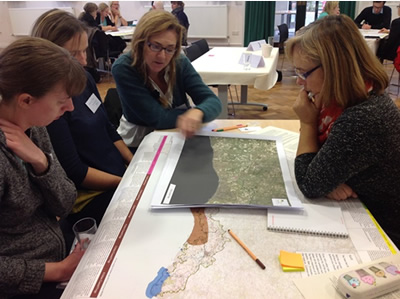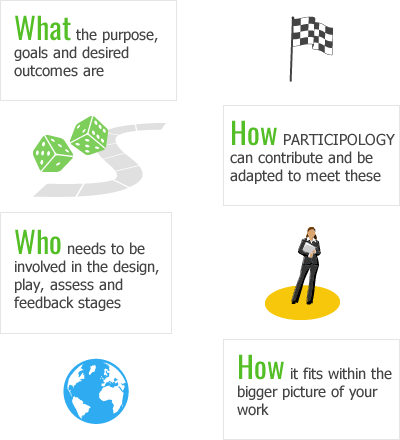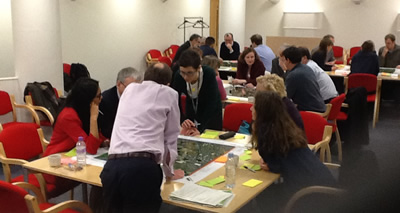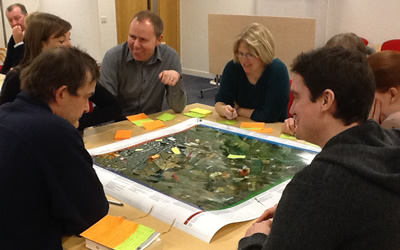Why use PARTICIPOLOGY?
PARTICIPOLOGY is a set of resources that makes participative exercises more engaging, fun and effective.
It revolves around using a board game format where players encounter questions/challenges as the dice throw dictates. The board, questions and rules of the game can be designed from scratch or existing templates can be adapted to your specific needs.
Participation is most effective and rewarding when following some basic principles of good practice. We encourage you always to pay attention to these.

PARTICIPOLOGY has many practical uses:
- As a staff development tool to help agencies and their staff adapt to changing circumstances
- Used by Natural England to help staff understand the ecosytem approach
- Used by Natural Resources Wales to explore the implications of the Wales Environment Bill for management of natural resources
- As a planning tool to help establish the foundations for plans, policies and programmes
- Used by the Lewes Neighbourhood committee to help plan and manage the urban edge of Lewes
- Used in the South Downs National Park to consider strategic and local green infrastructure issues
- As an educational tool to help understand land use conflicts
- Used by Queen Mary Grammar School (Walsall) in A-Level Geography to understand better the challenges and opportunities for urban growth
- Used by students at Salford University to discuss complex resource management issues
- Used by Climate KIC West Midlands to explore 21st century sustainability and climate change issues by developing likely scenarios and dilemmas (you can find their work in the questions bank)
- As a collaborative management tool to discuss area initiatives
- Used by Nebraska Rural Futures Institute (USA) to develop their own board and questions to discuss tricky river basin management issues
- Used by Greater Birmingham and Solihull Enterprise Partnership to design a game of growth as part of their consultation process for the emerging spatial plan
- Used by Malmö City Council (Sweden) to highlight and discuss competing priorities (using a rural fringes board)
- As a conflict management tool to help people deal with a range of controversial issues in their area, work or setting
- Used by Adelaide University to develop a platform for dialogue with a range of planning and community stakeholders (adapted templates and questions)
- Used by Ghent University to understand landscape challenges in rural areas of Flanders
Things to know before you start:


Department of Communities and Local Government event (February 2014)

Optimising your PARTICIPOLOGY experience
1. PARTICIPOLOGY is not an end in itself. It needs tailoring to meet your specific goals and resources.
2. Consider the value of your participants designing the board, questions and scenarios themselves to maximise their buy in and to learn about the bigger picture of the exercise.
3. Use the game format to create a safe and non-threatening environment for deliberation and discussion. The game environment can help break silos and polarisation of issues to enable more positive exchanges within and across different sectors, publics and issues. Conflict is healthy in such situations and needs to be managed, not suppressed.
4. Use PARTICIPOLOGY to help maximise knowledge exchange through sharing your lessons. Upload your case studies and evaluations using our ready to use templates.
